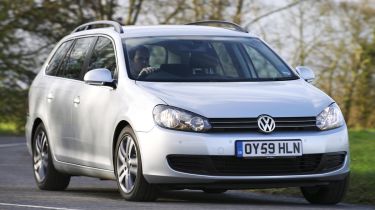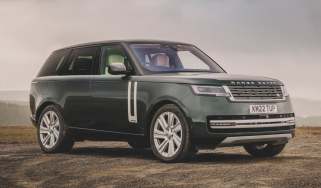Volkswagen Golf Estate (2009-2013) review
The VW Golf Estate is a smartly-styled, comfortable and efficient alternative to the Focus Estate and Astra Sport Tourer

The Volkswagen Golf Estate is a smart and classy alternative to the Ford Focus estate and Vauxhall Astra Sport Tourer. It might look like the current Golf hatchback, but it is in fact an update of the previous-generation MkV Golf. While the hatchback offers 350 litres of boot space, this estate version has a 505-litre boot and a maximum carrying capacity of 1,495 litres. There's a range of punchy and efficient engines, which includes the excellent 1.4 TSI and eco-friendly 2.0 TDI BlueMotion. Every version comes with a decent haul of standard equipment but it's not as fun to drive as some of its rivals and VW's reputation for reliability isn't what it was.
Engines, performance and drive
There's a wide choice of engines, starting with a 1.2 TSI, which produces 103bhp and 250 Nm of torque for a 0-62mph time of 11.3 seconds. There's also a 120bhp 1.4-litre TSI, which can go from 0-62mph in 9.9 seconds and has a top speed of 125mph. Diesel buyers can choose from a 1.6-litre TDI with 89bhp, 103bhp or a BlueMotion version also with 105bhp, and a 138bhp 2.0 TDI. The eco-friendly BlueMotion produces 250 Nm of torque and can do 0-62mph in 11.9 seconds, while the most powerful diesel has 320 Nm of torque and has a 0-62mph time of 9.7 seconds. As it's based on the previous-generation Golf, the estate doesn't drive as well as the Mk VI Golf but the ride is comfortable, the steering is accurate and the seats are supportive, too.
MPG, CO2 and Running Costs
The BlueMotion version is one of the most expensive to buy, but will offer the lowest running costs by a mile and should retain a decent chunk of its value, too. It comes with stop-start, brake energy recuperation and a gearshift indicator, which suggests which gear is best for every situation. Average fuel economy is 67.3mpg while CO2 emissions are just 109g/km (or 65.7mpg and 113g/km for the DSG automatic). The entry-level 1.2 TSI can manage a respectable 48.7mpg and 136g/km of CO2, while the most powerful TDI can do 57.6mpg and 128g/km (52.3mpg 139g/km for the DSG 'box). The Golf Estate is available with a fixed-price servicing plan for £329, which last for three years or 30,000 miles, whichever comes first.
Interior, design and technology
The Golf Estate looks just like a stretched version of the Golf hatchback and its smart, understated looks makes it popular with buyers. The interior is robustly built, with a simple layout and chunky switchgear - although the overall effect is plain. There are three trim levels - S, SE and Sportline - and all versions come with air-con, all-round electric windows, DAB and black roof rails as standard. SE adds 16-inch alloy wheels, cruise control and Bluetooth, while Sportline models get 17-inch alloys, sports suspension, front sports seats and a multifunction steering wheel.
Practicality, comfort and boot space
The Golf Estate offers 505 litres of boot space (compared to 350 litres for the hatchback), and a mammoth 1,495 litres with the rear seats folded. This is just 40-50 litres less than the Ford Focus and Vauxhall Astra estates. The boot opening is wide, and the flat loading area and lack of boot lip make loading large items easy. That said, the sloping roofline does limit practicality. Inside, there's plenty of head and legroom for five adults, plus there's a cooled glovebox, too.
Reliability and Safety
The sixth-generation Volkswagen Golf has a five-star Euro NCAP crash test rating. Standard safety kit includes ESP, ABS, anti-whiplash headrests and driver, passenger, curtain and side airbags. Volkswagen reliability isn't what it was, though, finishing a disappointing 18th out of 30 in the 2012 Driver Power survey. The interior feels robust and the materials are all high quality. There are no reports of any major problems, but there are a few niggling issues with the fit and finish.



